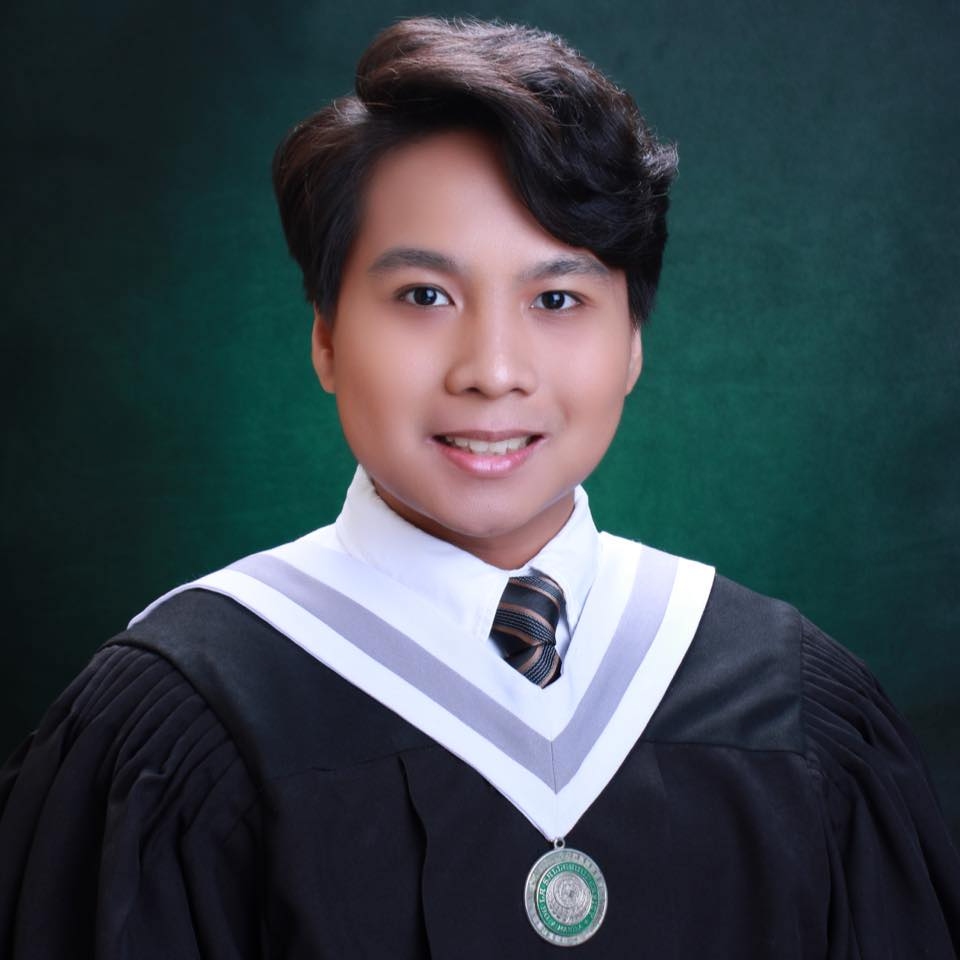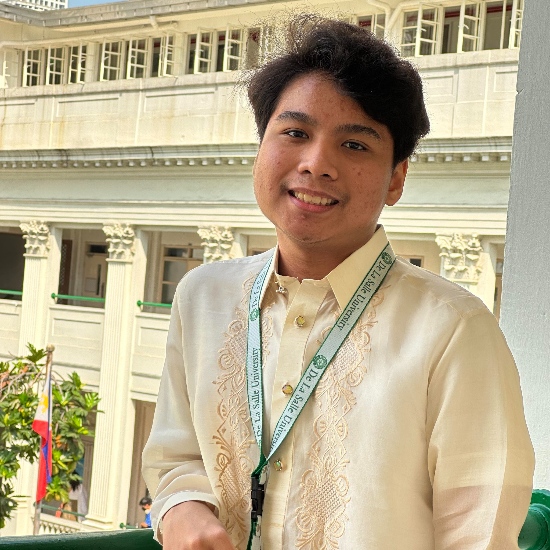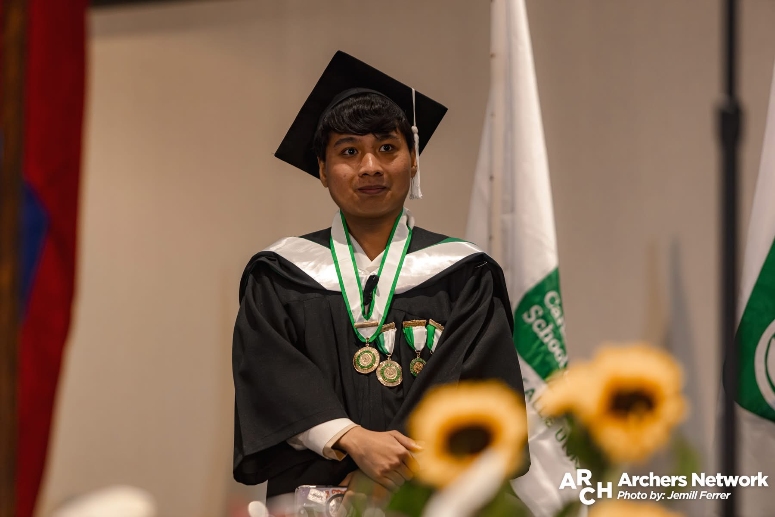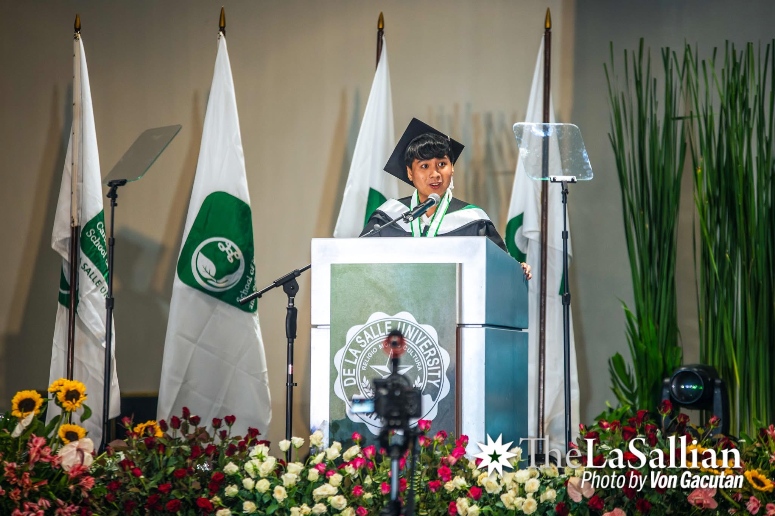This DLSU graduate, who's on the autism spectrum, achieves summa cum laude
For Juan Alfonzo Pulhin Dacumos, being on the autism spectrum isn't limiting. In fact, he graduated summa cum laude at De La Salle University.
A psychology major, Dacumos touched the hearts of many during his recognition rites speech as he highlighted how his university encouraged him to thrive in a way that allowed him to embrace his neurodivergence.
“Autism has been treated as an inherent hindrance that needs to be hurdled for flourishing in the future. For so long, people suggested autistic individuals were incapable of succeeding and achieving typical life goals such as strong careers, living independently, or even graduating with flying colors,” he said.
“I had the tendency to leave in the middle of conversations. Without any real cue or in inappropriate times, I would just walk away. Anywhere else, I would have been scolded and instructed to correct it. Yet, you never criticized me nor saw a deficit, you saw a difference. A difference that never made me inferior or less capable. Instead, you helped me understand how it relates to my autism and how I can move forward,” he continued.
PhilSTAR L!fe had a chance to have a heart-to-heart talk with Dacumos on his journey to acceptance and becoming his best self.
Diagnosed late in life

Dacumos only learned that he was autistic when he was 18 years old.
"Initially, I went [to see professionals] for mental health support because I was showing depressive symptoms when I was in high school. I had a lot of difficulty navigating through the social rules and the social complexities of [what] high school life looked like," he said.
As he met with clinicians, they began to notice some of his very repetitive, restrictive behaviors on how he would approach situations or how he would calm himself.
"They initially developed the suspicion that I was on the spectrum, and then they started talking about it with my parents. And then when they looked back at my life, they really started to notice some of the interests I had when I was a kid," Dacumos said.
As a toddler Dacumos fostered a deep interest in flags and had already memorized every country's flag at the age of two. He was also quite sensitive to the sound of fireworks and would break down whenever he heard them.
Once he was assessed for autism and was officially diagnosed, Dacumos shared that he and his family were initially hesitant to be open about it with others due to the stigma surrounding autism.
"In the Philippines, our autism characterization, our presentations of autism, our understanding of autism is very deficit-centered," he said. "Autism is seen as something inherently negative."
"I've seen a lot of parents, I've seen a lot of people who really wish for autism to be 'cured' with other people. And that is [unfortunate] because that's kind [of] stigma is [what] makes a lot of autistic people feel really insecure with their condition and really pessimistic about their condition and their life," he added.
Adjusting to his condition

Dacumos' diagnosis came as he was just starting his college journey, which only added to the emotional and mental weight he was carrying on his shoulders.
"At the time, I was not ready to face the stigma of autism. Being 18 and then transitioning into college, that's already a big change. And then you have to get the diagnosis and then trying to understand how that diagnosis works and then understand how it relates [to] your environment," he said.
"There was so much to process to the point that it made me say, 'Okay, I really need to understand this first before I could face the world with it.' And with that, it felt like there was a certain weight," he continued. "Whenever I try to mask or I try to hide my autism presentations, it makes it difficult for me to manage through very difficult situations."
However, Dacumos was able to find a support system during his academic journey through his friends as well as his professors, who all helped him adjust in a way that was respectful and empowering, rather than limiting.
"I do present some of my autism manifestations unconsciously... and they approach it in a way that doesn't go along the lines of, 'No, correct this.' They don't tell me, 'You should correct this, you should hide this.' They tell me, 'Oh, these are some of the manifestations that we do observe with you. And I think it's best if you also know them so that you could better understand your autism too,'" he recalled.
"They knew that I was diagnosed late, so they know that I was going through college with the journey of understanding my autism itself. So they really [approached] it in a way where it doesn't demean my condition at all," he added.
As for his professors, Dacumos would inform them that he was autistic from the start, as he was worried that there may be times when he would get overstimulated to the point that he might shut down or break down.
"Initially, it was my mentor who would tell them, and then during my second year, my mentor encouraged me to tell them myself so that I could practice my self-advocacy. They've been very open. They've actually asked questions about it. They asked, 'What do you need? What do they need to do? What do they need to know? What are the protocols?'" he said.
"It made me feel like they were really there for me in a lot of ways. They were really interested in supporting me in whatever way they [could.] So I really owe it to both of them, my social circle, my friends, my professors, my mentor, and the department," he highlighted.
Becoming summa cum laude

When it comes to his studies, Dacumos shared that he was able to harness some of the manifestations of his autism towards his academics, particularly his "very strong insistence on structure."
"Whenever I would study for an exam or complete a task, what I would do is that I would look at the task, I would break it down into very specific, smaller tasks that are very connected to one another, then I would schedule it throughout the next week or two, and then I would follow that very specifically," he said.
But this also proved to be a challenge as he would get overwhelmed whenever his system got disrupted. Nevertheless, he instilled a mindset that things might not always go his way and that he needed to understand how to adjust to different scenarios.
At the end of the day, however, what paved the way for Dacumos to achieve the highest honor in his school was his hard work and passion for learning.
"Graduating summa cum laude is something that a lot of people really, really work really hard to achieve, and that's no different from mine because I really put a lot of effort into my academic journey in DLSU," he underscored.
"It felt like the culmination of everything that I gave to not only my academic journey and giving all my requirements and all my efforts into DLSU, but also all the efforts into understanding myself and how I want to grow and where I want to be in my life," he added.
Proudly autistic

Thanks to the supportive environment he found at DLSU, Dacumos gained the strength to disclose his autism without fear of stigma or repercussions during his speech as he graduated summa cum laude.
"Reaching this milestone makes me feel like all of these fears should not really be there at all. I should not look down on myself. People should never look down on me because I'm autistic, because it's a difference. It's something that doesn't necessarily make me inferior as a person," he stressed.
"Having this milestone and reaching such an achievement kind of affirms to me and to other people that there's nothing wrong with being autistic and we could still achieve these certain achievements with the condition," he added.
Now that he has reached the finish line of his college journey, Dacumos plans to continue his studies abroad while also writing research papers at DLSU. He also expressed interest in doing advocacy work for neurodiversity programs and activities.
On his advice to fellow autistic individuals who may be feeling insecure about their condition, he said, "There is nothing wrong with being autistic. I would really suggest trying to understand how your autism manifests for you specifically."
"Once you have that understanding of how you present your autism, how it affects your life, how it affects your well-being, how it could be used to promote you and to further move forward in your life, that's the time where you could start living with your autism in itself. Because at the end of the day, that really should be the goal," he added.


